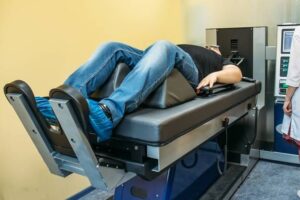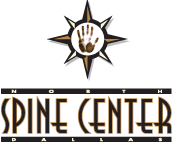Introduction
Living with persistent lower back pain or sciatica can be a significant burden, impacting daily life and limiting physical activity. Numerous people seek various treatments, and one that’s gaining popularity is spinal decompression treatment.
For those requiring an effective sciatica treatment in Dallas, this non-surgical approach offers a beam of trust. But what precisely is spinal decompression therapy, and how effective is it in alleviating sciatica and lower back pain? This blog explores the benefits, instruments, and results of spinal decompression therapy, including DRX9000 therapy and its applications.
Understanding Spinal Decompression Therapy
Spinal decompression therapy is a non-invasive, FDA-approved treatment method aimed at relieving pressure on spinal discs and nerves. During the therapy, patients are gently stretched on a specialized table, such as the DRX9000. This stretching action creates a negative pressure within the spinal discs, encouraging herniated or bulging discs to retract. This process also promotes increased blood flow, enabling the essential nutrients and oxygen needed for healing.
The Role of the DRX9000 Machine
The DRX9000 therapy device is specifically designed for precise spinal decompression. It enables doctors to target specific spine areas, ensuring that decompression is applied to the exact regions that require it. This targeted approach is highly beneficial for those with herniated or degenerative discs, where traditional therapies have had limited success.
Sciatica and Lower Back Pain: Common Causes and Symptoms

Sciatica is the pain that radiates along the sciatic nerve, which travels from the lower back through the hips and down each leg. Often caused by a herniated disc or spinal stenosis, sciatica pain can range from mild to severe and may include symptoms such as numbness , tingling, and weakness in the leg.
Lower back pain, on the other hand, can be due to extend of factors, including muscle strain, ligament sprains, and degenerative disc disease. When these issues affect the discs or nerves, they can lead to chronic pain and mobility limitations.
Why Choose Spinal Decompression Therapy for Sciatica?
Spinal decompression therapy, especially when performed with DRX9000 therapy, can be an effective sciatica treatment for Dallas residents seeking non-surgical solutions. By relieving pressure on the sciatic nerve and spinal discs, decompression therapy helps reduce inflammation and allows the body to heal naturally.
How Spinal Decompression Therapy Works for Sciatica and Lower Back Pain

During a typical session, you lie comfortably on the decompression table while a specialized belt is placed around your waist. The machine then gently pulls and relaxes the spine in cycles, gradually creating negative pressure within the affected discs.
Key Benefits of Spinal Decompression Therapy:
- Reduces Disc Pressure: The therapy creates a negative pressure in the spine, helping bulging or herniated discs retract, thus relieving pressure on surrounding nerves.
- Promotes Healing: By improving blood and nutrient flow, spinal decompression helps promote natural healing of the spine.
- Non-Invasive: Unlike surgery, spinal decompression requires no incisions, which means a quicker recovery with fewer risks and side effects.
- Long-Term Pain Relief: Many patients report a significant reduction in pain and improvement in mobility after several sessions.
Is Spinal Decompression Therapy Right for You?
Spinal decompression therapy is ideal for those experiencing chronic back pain or sciatica, especially if traditional treatments haven’t provided adequate relief. However, it’s essential to undergo a thorough evaluation by a qualified provider to determine if this therapy is suitable for your condition.
In Dallas, many patients suffering from sciatica or looking for effective spinal decompression treatment have seen substantial improvement with DRX9000 therapy. The best candidates are individuals with:
- Herniated or bulging discs
- Sciatica or nerve pain
- Degenerative disc disease
- Posterior facet syndrome
What to Expect During Treatment

A standard spinal decompression session lasts around 30 to 45 minutes. Patients typically need multiple sessions—often 20 to 28 sessions over a span of five to seven weeks—to achieve optimal results.
Comparing Spinal Decompression to Other Sciatica Treatments
When considering sciatica treatment options, spinal decompression stands out for its non-surgical, low-risk approach. Other common treatments include:
- Physical Therapy: Helps strengthen muscles around the spine but may not address underlying disc issues directly.
- Medication: Offers temporary relief but doesn’t solve the root cause.
- Surgery: Effective for severe cases but comes with higher risks, extended recovery times, and potential complications.
For many Dallas residents, spinal decompression provides a safer, non-surgical alternative to address the root causes of sciatica and back pain effectively.
Frequently Asked Questions About Spinal Decompression Therapy
- How long does it take to see results?
Many patients report pain relief within a few sessions, though complete treatment may take several weeks for maximum benefit. - Is DRX9000 therapy covered by insurance?
Coverage varies, so it’s best to check with your insurance provider regarding specific policies for DRX9000 therapy. - Are there any side effects?
The procedure is generally safe with minimal risks, but some patients may experience mild soreness following treatment, similar to the feeling after a good workout. - Can I continue daily activities after a session?
Yes, spinal decompression therapy is non-invasive, and patients can typically resume their daily activities after each session.
Final Thoughts

Spinal decompression therapy, especially using advanced techniques like the DRX9000, offers a promising approach for those dealing with sciatica and chronic back pain. As a non-surgical, safe, and effective treatment, spinal decompression is becoming a popular choice for sciatica treatment in Dallas and beyond. If you’re struggling with persistent lower back pain or sciatica, consider consulting with a specialist to see if spinal decompression therapy could be the answer you’ve been seeking.
Citations:
- https://www.webmd.com/back-pain/spinal-decompression-therapy-surgical-nonsurgical
- https://www.webmd.com/back-pain/features/vax-d-treating-back-pain-without-surgery

